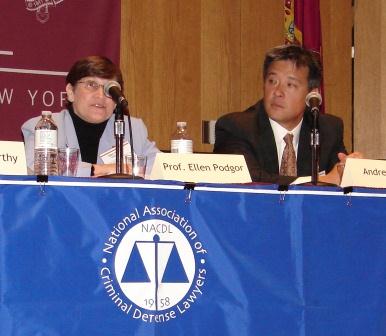Consistently benefiting the prosecution, a request to instruct the jury on willful blindness usually comes on the heels of weak evidence of knowledge, without any advance warning to the defense, and invites the jury to convict based on evidence of mere negligence or recklessness.
This page provides news and resources on the willful blindness doctrine and efforts at meaningful reform.
 In 2011, with the civil patent infringement case Global-Tech Appliances, Inc. v. SEB S.A., the Supreme Court affirmed the validity of the willful blindness doctrine in both civil and criminal settings while simultaneously establishing some standards for the doctrine's application beyond that required in most federal circuit courts. At the outset, this guidance appeared to be a step in the right direction – albeit insufficient to protect due process rights. Since Global-Tech, however, the federal courts of appeals have been reluctant to apply this more stringent standard in criminal cases and the playing field has remained dramatically uneven.
In 2011, with the civil patent infringement case Global-Tech Appliances, Inc. v. SEB S.A., the Supreme Court affirmed the validity of the willful blindness doctrine in both civil and criminal settings while simultaneously establishing some standards for the doctrine's application beyond that required in most federal circuit courts. At the outset, this guidance appeared to be a step in the right direction – albeit insufficient to protect due process rights. Since Global-Tech, however, the federal courts of appeals have been reluctant to apply this more stringent standard in criminal cases and the playing field has remained dramatically uneven.
Pictured above: NACDL Members Professor Ellen Podgor and Andrew Wise discussing the willful blindness doctrine at NACDL's 7th Annual Defending the White Collar Case Seminar on September 23, 2011.
News, Commentary & Advocacy
"Landmark 'willful blindness' decision has failed to deliver," Daily Journal, April 4, 2014.
"Defense Witness Immunity & Global Tech - Important Issues on Cert," White Collar Crime Prof Blog, October 7, 2012.
"Patently Unusual: How a Recent Supreme Court Patent Decision Alters the Landscape for Proving Criminal Knowledge," White-Collar Crime, Westlaw Journal, September 2011.
"Supreme Court Speaks About Willful Blindness," White Collar Crime Prof Blog, June 1, 2011
"Improving 'Willful Blindness' Jury Instructions In Criminal Cases After High Court's Decision in Global-Tech," BNA Criminal Law Reporter, June 15, 2011
"Quality Control at the Second Circuit: 38 Years of Willfulness Jurisprudence Thrown Out in Kaiser?," White Collar Crime Prof Blog, July 3, 2010
Prosecutions Based on Willful Blindness
Wesley C. Walton v. United States
- U.S. Supreme Court denied the petition for cert. on Jan. 7, 2013.
- Amicus Filing: NACDL Amicus Brief in Support of Petition, Wesley C. Walton v. United States, No. 12-5847 (Sept. 19, 2012)
- Defense Filing: Petition for Writ of Certiorari, Wesley C. Walton v. United States, No. 12-5847 (Aug. 16, 2012)
- Circuit Opinion: United States v. James Brooks, Wesley C. Walton, James Patrick Phillips, 681 F.3d 678 (5th Cir. 2012)
Global-Tech Appliances, Inc., et al. v. SEB S.A.
- Supreme Court Opinion: Global-Tech Appliances, Inc., et al. v. SEB S.A., No. 10-6 (U.S. May 31, 2011)
United States v. David C. Geisen
- U.S. Supreme Court denied the petition for cert. on April 4, 2011.
- Defense Filing: Petition for Writ of Certiorari, David C. Geisen v. United States, No. 10-720 (Dec. 1, 2010)
- Government Filing: Brief For the United States In Opposition to Petition for Writ of Certiorari, David C. Geisen v. United States, No. 10-720 (March 2011)
- Defense Filing: Reply Brief for Petitioner In Support of Petition for Writ of Certiorari, David C. Geisen v. United States, No. 10-720 (March 2011)
- Circuit Opinion: United States v. David C. Geisen, 612 F.3d 471 (6th Cir. 2010)
United States v. Mark P. Kaiser
- Circuit Opinion: United States v. Mark P. Kaiser, No. 07-2365-cr (2nd Cir. July 1, 2010) (holding the "conscious avoidance" jury instruction in error because it failed to include either the "high probability" or the "actual belief" language that is required and did not suggest that actual belief would absolve Kaiser of culpability).
- Defense Filing: Brief, United States v. Mark P. Kaiser, No. 07-2365-cr (2nd Cir. Oct. 2008)
- Defense Filing: Reply Brief, United States v. Mark P. Kaiser, No. 07-2365-cr (2nd Cir. March 2009)
United States v. Richard Stadtmauer
- Circuit Opinion: United States v. Richard Stadtmauer, 620 F.3d 238 (3rd Cir. 2010) (upheld willful blindness instruction in criminal tax fraud prosecution).
- Defense Filing: Memorandum of Richard Stadtmauer In Opposition To The Government's Request For A Deliberate Ignorance or Willful Blindness Charge, United States v. Richard Stadtmauer, No. 05-249 (D.N.J. May 22, 2008)
Programming
The Accidental Felon: Challenging the Expansion of the Willful Blindness Doctrine
In Global-Tech Appliances, Inc. v. SEB S.A., the Supreme Court decided a civil patent case that dramatically altered the criminal legal landscape of willful blindness. In this one-hour program, our highly experienced panelists Timothy O'Toole (Miller & Chevalier, Washington, DC) and Ellen Podgor (Stetson Univ. College of Law, Gulfport, FL), evaluate the contours of the willful blindness doctrine, explore the latest jurisprudence, and offer practical defense strategies. (Recorded June 17, 2011)
Ignorance is Bliss, But Is It Also a Crime? Opening Your Eyes to the Willful Blindness Doctrine
The willful blindness or conscious avoidance doctrine has allowed prosecutors to obtain convictions against several high-profile white collar defendants, including Bernard Ebbers, Ken Lay and Jeff Skilling. This highly experienced panel evaluates the contours of the doctrine, explore recent cases that highlight the current state of the law and offer successful defense strategies. This program features Moderator Andrew Wise (Miller & Chevalier, Washington, DC), joined by Daniel Brown (Murphy & McGonigle, Washington, DC), K.C. Maxwell (Law Office of K.C. Maxwell, San Francisco, CA), and Alexandra Walsh (Baker Botts, Washington, DC). (Recorded September 17, 2010)






